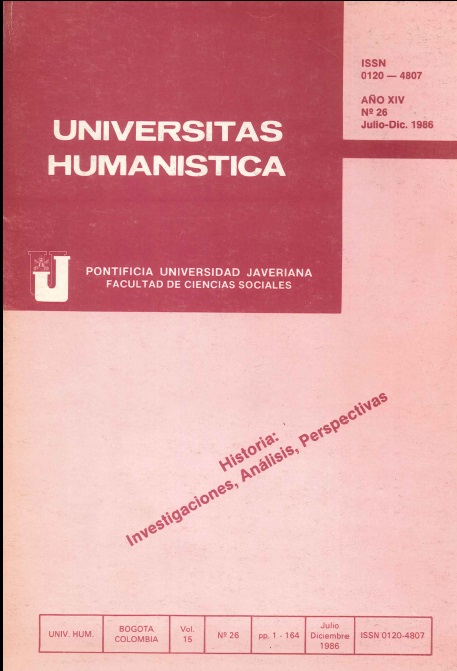Abstract
Varios autores han señalado la supuesta influencia del filósofo Jaime Balmes en el pensamiento colombiano del siglo pasado. Sirvan como ilustraciones dos ejemplos recientes publicados en el segundo tomo del Manual de historia de Colombia. Describiendo la administración del Presidente Herrén, Fernando Díaz Díaz nos dice que "... en 1844 retornó al país la Compañía de Jesús y se expidió un Plan de Estudios (inspiración de Mariano Ospina Rodríguez) que reemplazó a Tracy por Balmes. . ." (1). También, Eduardo Camacho Guizado, en su ensayo sobre la literatura colombiana, nos dice: "(José Eusebio) Caro acudió en busca de respuestas a los filósofos más dispares como Bentham, Voltaire, el propio Comte, Balmes, de Maistre, pero regresó al catolicismo que le ofreció la mayor seguridad espiritual" (2). Es por eso que los nombres de Balmes, Ospina, y Caro han llegado a ser ligados en la historia de Colombia (3).

This journal provides immediate open access to its content on the principle that making research freely available to the public, encourages greater global exchange of knowledge.
The journal Universitas Humanística is registered under a Creative Commons Attribution 4.0 International Public License. Thus, this work may be reproduced, distributed, and publicly shared in digital format, as long as the names of the authors and Pontificia Universidad Javeriana are acknowledged. Others are allowed to quote, adapt, transform, auto-archive, republish, and create based on this material, for any purpose (even commercial ones), provided the authorship is duly acknowledged, a link to the original work is provided, and it is specified if changes have been made. Pontificia Universidad Javeriana does not hold the rights of published works and the authors are solely responsible for the contents of their works; they keep the moral, intellectual, privacy, and publicity rights.
Approving the intervention of the work (review, copy-editing, translation, layout) and the following outreach, are granted through an use license and not through an assignment of rights. This means the journal and Pontificia Universidad Javeriana cannot be held responsible for any ethical malpractice by the authors. As a consequence of the protection granted by the use license, the journal is not required to publish recantations or modify information already published, unless the errata stems from the editorial management process. Publishing contents in this journal does not generate royalties for contributors.


